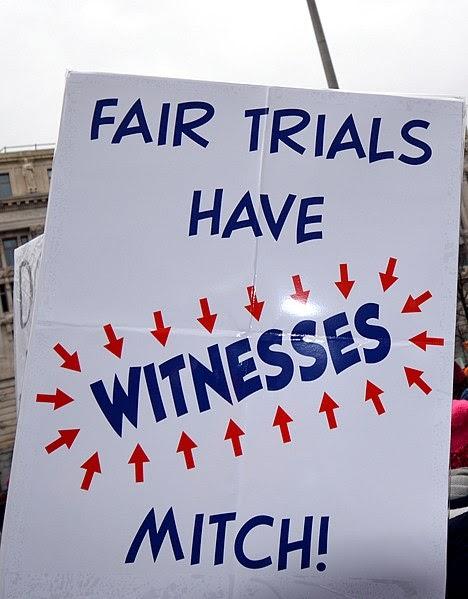
Welcome back to the Impeachment Trials of President Donald Trump. The groundwork for these trials was laid way back in July 2019, when President Trump called the President of Ukraine, Volodymyr Zelenskey, and promised military aid in exchange for dirt on presidential candidate Joe Biden and his son, Hunter Biden, formerly a board member of the Ukrainian natural gas company Burisma. In August, the Whistleblower complaint was made, and the call came into the public eye in September. Rumors of impeachment began to swirl, and on September 24, Nancy Pelosi announced that an impeachment inquiry would get underway. Witnesses were deposed, testimony was taken, and on December 13, the House Judiciary Committee voted along party lines to impeach Donald Trump, and the proceedings moved to the Senate. To add more context into his month’s impeachment events, check out “A Guide to Trump’s Impeachment Inquiry” on fhspost.com.
The overarching concern throughout these proceedings was “Will Senate Democrats be able to swing enough members of the Senate to convict Trump?” Because while nothing will change the fact that he has been impeached under two articles of impeachment, those being abuse of power and obstruction of Congress, he is only removed from office if he is convicted in the Senate, which Republicans control.
The basis of the Democratic attack is that President Trump knowingly withheld military aid from Ukraine in exchange for information on a political rival, and used the power of his office to avoid punishment for several unconstitutional acts, including the travel ban on people seeking to enter the U.S. from African and Middle Eastern countries, barring federal officials from appearing before Congress, and even shutting down investigations centered around him. Normally, this would be a sound attack and could sway a truly unbiased jury in a Senate courtroom, but Trump’s lawyers and Senate Republicans have openly worked to make sure that this will not happen. Senate Majority Leader Mitch McConnell has spoken publicly, saying “I’m not an impartial juror.”
The Republican’s defense consists of relying on the party line vote that will come in the Senate, the job security that comes with supporting Trump as a Republican Senator, along with a narrative that shows Trump as the victim, the Democrats going after him because, “They just hate the guy,” says Rick Scott, Florida Senator. They are also relying on Mitch McConnell’s iron grip on the Senate. It is a defense that has worked for three years of the Trump presidency, and it will continue to work for a fourth. On Friday, January 31, the Senate voted to not allow for more witnesses to testify, and no new evidence to be presented. Despite the Democrat’s efforts, only two Senators crossed the aisle, Susan Collins of Maine and Mitt Romney of Utah. But even if the vote had passed, it would have been a hard run to convict. Senate Democrats would have had to swing 21 Republican senators, which would be hard to do, even on a lucky day. On Wednesday, February 5, the Senate acquitted Trump, essentially along party lines.
The effects of the trial will not end here. Many Democrats who won Senate seats in red states could find their seats in jeopardy next November, as Republicans act fast to return Senate seats to their own control. But the two Republicans who crossed the aisle, Collins and Romney, may also find their positions in jeopardy, seeing as Trump has attacked Romney already for his vote, Collins and Romney’s support in the Senate could dwindle. Not only that, but the President facing no consequences for impeachable offences could alter the presidential justice system in the future. In short, while the trial of President Trump will be short, its impacts will be felt long into the future.

































